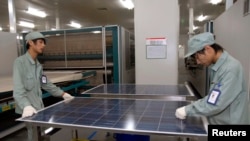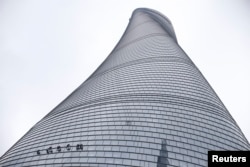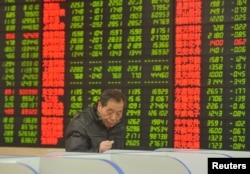China has unveiled an ambitious plan that aims to raise $230 billion through green bonds for environmental projects over the next five years. If successful, with an average of $46 billion a year, it would raise as much as the rest of the world combined.
The move will have major implications for the world environment industry as green bonds are meant for new and existing green infrastructure projects. Some experts and European businesses are worried about the new Chinese attempt at green financing.
“China is clearly crowning the market this year,” said Ulrik Ross, global head of public sector and sustainable financing for HSBC, at a recent event in London. “Why should they be ahead? We have had all the opportunities in Europe and the western world to be ahead but we’re not, and that’s just reality. We need to wake up and start to take action.”
The past few years has seen a plethora of trade disputes as China-made environmental equipment, including solar panels, flooded into western markets.
“Chinese green technology and energy equipment manufacturers are already very competitive globally, dominating the global market for photovoltaics with many European competitors being crowded out of the market,” said Jost Wuebbeke, Head of Economy and Technology Program at the Berlin based Mercator Institute for China Studies (MERICS).
Game of numbers
What has amazed industry watchers is the jump in Beijing’s efforts after Chinese President Xi Jinping attended the climate change conference in Paris last December.
The People’s Bank of China (PBOC), the country’s central bank, recently announced a quota system for banks and financial institutions to float green bonds worth 300 billion Yuan (over $45 billion) in 2016. This is in sharp contrast to the performance of the Western world last year.
U.S. companies floated $10.5 billion worth of green bonds in all of 2015 while Europe issued $18.4 billion, according to the Climate Bonds Initiative.
Within weeks of the PBOC directive, Chinese banks and companies collected $4.6 billion by selling green debt paper. They included the Shanghai Pudong Development Bank and the China Industrial Bank, which issued three-year bond paper at an annual interest rate of 2.95 percent.
Chinese companies would be able to raise $46 billion annually through the green instrument until 2020, said Xu Nan, a senior policy analyst at the Research Center for Climate and Energy Finance under the Central University of Finance and Economics.
International impact
An important question is who will buy China’s green bonds, and why. There are signs that a sizable part of the bonds will be sold to municipal governments and state owned enterprises, who often feel duty bound to support governmental plans.
But a part of it will also be sold in the Western world, which has a growing market for socially responsible investments (SRI). In fact, the Chinese central bank targeted the SRI market as it issued detailed directives to make sure that receipts of green bonds are not used in polluting industries like oil.
Many observers feel China will have an uphill task garnering support from the SRI segment of the investing population.
"European investors will probably be very interested in China's Green Bonds, but surely take a close look at potential controversial issues linked to some projects,” said Julia Haake, Director International Business Development at the Munich based oekom research.
Some of them are very sensitive to social issues like human rights and labor rights, she said. “They will look for transparency in these areas and sometimes choose not to invest if they don’t find enough information,“ Haake said.
Wuebbeke of MERICS cites another reason to explain why Chinese issuers may have difficulty in selling bonds in the Western world.
“The green bond market in China starts at a very difficult time. Due to the economic slowdown and the recent turmoil in the stock market, foreign investors are hesitant to invest in the Chinese bond market and green bonds will not change this,” he said.
Government motives
Smog and pollution have caused widespread resentment across the country, leaving Chinese officials looking for alternative and cheaper ways to fund renewable energy and energy efficiency projects, public transit programs, water management and pollution control schemes, sustainable agriculture and forestry initiatives, and similar efforts.
“China has been setting more and more ambitious green and low carbon growth agenda and targets, aligned with global trends as well. Delivering those set goals and objectives requires adequate and innovative capital flow, so the objectives are no surprise at all,” said Changhua Wu, Greater China Director of The Climate Group.
Green bonds, which can be raised at less than three percent annual interest rate, are 30-40 percent cheaper compared to traditional bank loans. The central bank’s benchmark rate is 4.5 percent, while commercial banks charge more.
The second reason is the weakened conditions of the country’s oil companies, which are grappling with a massive reduction in the price of oil. Rating agencies have lowered the ratings of many energy companies, making it difficult to raise funds from the market.
"We don't believe China's national oil companies will be able to stabilize their cash flow adequacy amid the current price environment, despite their efforts to cut capital expenditure and costs," Standard and Poor said in late January while lowering the credit profile of China Petroleum & Chemical Corp and China National Offshore Oil Corp. (CNOOC).







